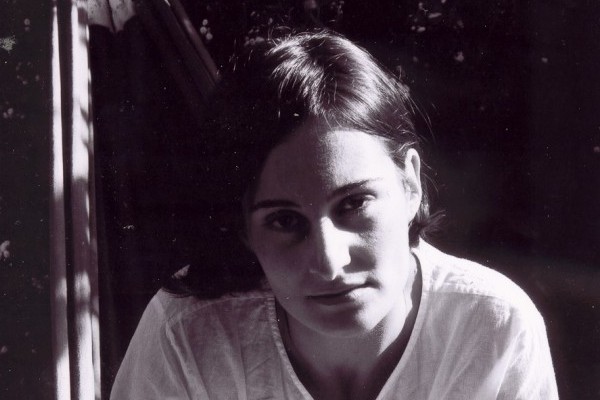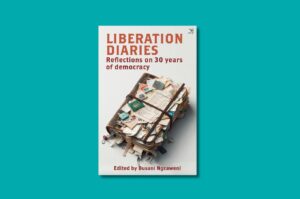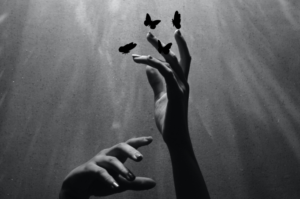Keeping our promise to bring you reviews of all five stories shortlisted for the Caine Prize, we featured Aaron Bady’s review of Billy Kahora’s story last week.
This week, it’s Nigerian novelist, Richard Ali, reviewing Diane Awerbuck’s story titled “Phosphorescence.” Awerbuck’s story was originally published in Cabin Fever, her 2011 short story collection. Read story HERE.
Let us know what you think of the story and Ali’s take on it.

by Richard Ali
Diane Awerbuck’s story, “Phosphorescence,” shortlisted for the 2014 Caine Prize for African Writing, is a tale of two characters framed by death. The first is a swimming pool that Alice has visited everyday for the last fifty years but that has been marked for demolition. The second character is Alice’s granddaughter Brittany. Failing at a suicide, she has been sent down to Cape Town expressly to keep away from death, away from the “people she hangs out with.” Brittany’s father, Sidney, a Johannesburg plastic surgeon, is Alice’s only child.
The story is simple enough. Alice, granddaughter in tow, heads out for her customary swim while Brittany, aloof and indifferent to the significances of Graaf’s Pool to her grandmother, sits on the sand, listening to music. Yet, the impending demolition of Graaf’s Pool has hung over Alice’s structured life for a month and each swim—being possibly the last—each swim marked with dips into memory and the implications of long familiarity, is an act of defiance for the older woman. Casting cares and swimwear away, Alice swims naked. She takes a longer swim than usual so that when she breaks the surface, she finds a worried Brittany waiting. Brittany decides to join her grandmother in the pool. But just as they get used to the older woman’s now shared “half-secret” place, they are disrupted by the roar of bulldozers come to life with demolition crew and the sudden reality of death amongst the debris of love and Graaf’s Pool.
Diane Awerbuck writes beautifully. She writes in a manner similar to fellow South African J. M. Coetzee in his better work. Consider this gem of perception—“Her top went next, then the shirts – three of them, layered archaeologically—until she [Brittany] was standing in her girlish underwear, a mystifying combination of cotton and wire scaffolding.” It says a lot about the character through whose eyes we see this. It is amusing to think of lace underwear in terms of “wire scaffolding,” but the image of clothes being “layered archaeologically” is a refreshing first. This is a case of language being used effectively given that “Phosphorescence” is at its core a story about age and youth and about the scars of a ruin left on the body by a failed suicide. But “Phosphorescence” is not for all this a story about loss. It is framed by death, yes, but it is really a different story.
The tension of the story lies on two levels—first, a grandmother’s has difficulty comprehending a granddaughter’s attempt kill herself, even while being aware of her own fragility and proximity to death. The second tension, equally important, is the imminent demolition of Graaf’s Pool and with it fifty years of Alice’s memories, including the birth of her son, the people who have haunted it, everything. The first tension is resolved at the point where Brittany joins her grandmother in the pool and comes up for air, both women grinning at each other. “With their hair wet,” observes the narrator, “they didn’t look very different.” The second tension is resolved by the bulldozers moving in to destroy the physical haven that was once Graaf’s Pool while also trapping the two naked swimmers in the pool
But there is an escape, and it is in crafting the means of their escape that this South African storyteller establishes her credentials as an important voice in African fiction for, by a sleight of hand, the tragic end of the pool, it’s loss, the destruction of its significancies is redeemed by Alice and Brittany who are reconciled by virtue of their shared immersion in the pool.
Towards the end of story, in one of the most moving moments, we find Alice gritting her teeth, shivering and then surrendering to Brittany’s—and youth’s—guidance. This is the thawing of the tension between them such that in the very last line, they “held hands.”
Of course, the colorful underwater phosphorescence of luminescent planktons is gone, of course Graaf’s Pool is demolished, of course Alice will die eventually. Yet, the point is that for a while, for the dizzying while during which the short story is rising and falling like a thrown stone, there is a defiance against death and a renewed will to live, to care and to love. And that really is the point. In achieving this, Diane Awerbuck’s story comes as perfectly as fiction ever will to reality—“Phosphorescence,” without doubt, is a near perfect story.
Read “Phosphorescence” HERE.
Come back next Tuesday for Orem Ochiel’s review of Okwiri Oduor’s story, “My Father’s Head.” Read it HERE.
***
 Richard Ali is a Nigerian lawyer and the author of City of Memories [Parrésia, 2012]. He edits the Sentinel Nigeria Magazine and is Publicity Secretary [North] of the Association of Nigerian Authors. He lives and writes in Jos, Nigeria.
Richard Ali is a Nigerian lawyer and the author of City of Memories [Parrésia, 2012]. He edits the Sentinel Nigeria Magazine and is Publicity Secretary [North] of the Association of Nigerian Authors. He lives and writes in Jos, Nigeria.
Follow Richard: @richardalijos









Margaux Castillo November 02, 2016 06:10
i'd like to ask about the title and please further expound on why it was chosen as the title. Any symbolism?